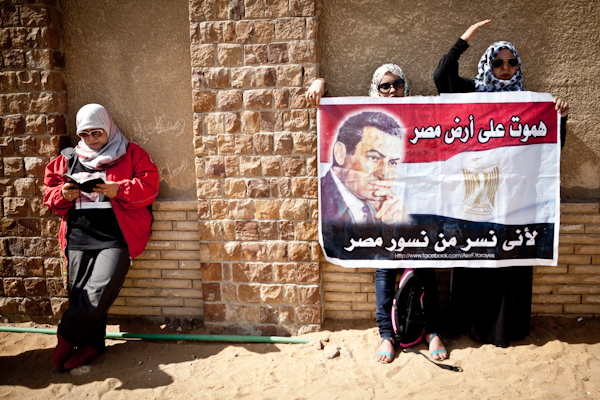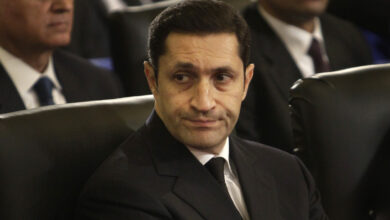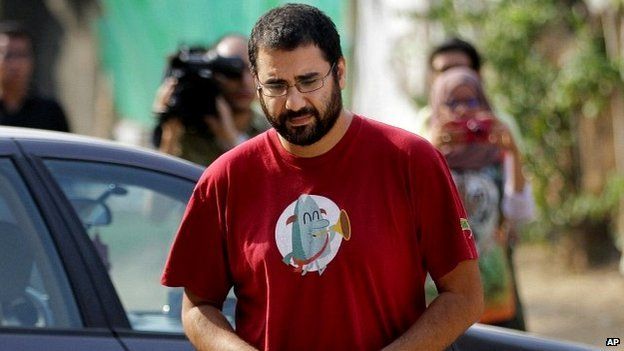
For fans of dark comedy, Monday’s papers are an essential read.
“Mubarak: the president of the Republic of Tora,” jeers Al-Wafd’s headline, above images of the former president sulking in his gurney and of his sons behind bars. The independent daily tied with the Wafd Party reports that the supposedly ailing ousted dictator “attempted to deal with the [Tora prison] warden as if he were still president.” The paper says Mubarak refused to accept the traditional blue uniform issued to inmates and insisted he be allowed to wear his “blue pajamas” instead. He was then admitted into the prison’s hospital wing, where he promptly kicked out all his nurses.
It continues, with all major papers reporting on Mubarak’s first night in Tora.
Al-Tahrir’s coverage has the ex-president popping sleeping pills and verbally assaulting his escort guards by “cussing their religion” when they tried to remove him from the helicopter upon arrival at the hospital — a process that took three hours, much to the independent daily’s amusement. Al-Tahrir reports that Mubarak only agreed to leave his helicopter when his head bodyguard informed him that by doing so, he’d be allowed to see his sons. Upon entering Tora, Mubarak was “astonished to realize it was not the International Medical Center,” where he had previously been held.
Mubarak was then allowed to see his son, who spent the night by his side, in a “direct and immediate violation of the law in his first day as an inmate,” Al-Tahrir reports, via its anonymous source. Their same source then proceeds to complain about how security measures have turned the prison’s medical wing into a “forbidden zone” where Mubarak’s head of security sits by his master’s side — measures that the source insists constitute a multitude of violations.
The same source then states that, despite popular misconception, Mubarak’s sentence encompasses the remainder of his life, not just the next 25 years. Even when early parole becomes an option in 2032, the source insists “the former president’s fate will be in the hands of prison authorities.”
Al-Shorouk reports that the sentenced criminal “passed out” on no less than three occasions during his registration process at the prison, and asked to have his personal staff from the International Medical Center transferred to jail with him, but the request was denied.
The independent daily elaborates on Mubarak’s refusal to disembark from the helicopter that transferred him to prison, occurring amid “a handful of smug smiles and far more teary eyes on the faces of the prison guards and police officials.” According to the paper’s unnamed source, the ousted president remained in his helicopter after it had landed, demanding to know how such an unfortunate turn of events could befall “the hero of the October War, the air force commander and lifelong military leader.”
Al-Shorouk’s coverage also includes a moment of Shakespearean self-reflection, with Mubarak reportedly overheard wondering aloud, “What will come after the sentencing of Mubarak? What else is there to be desired after all that has taken place?” The paper reports: “[Mubarak] then began shouting, ‘May God punish those responsible for sending me to jail, this is unjust! Unjust! I have always been with the people,’ before surrendering to sleep until the morning.”
The paper also reports that enhancements made to the prison hospital, including a range of “state-of-the-art medical equipment” and three air conditioners, cost the state about LE4 million.
Details are slighter on the state-owned side. Al-Akhbar mentions the former president’s “panic attacks” and that he went to bed on an empty stomach after refusing to eat prison food, while Al-Ahram barely acknowledges Mubarak’s trip following his sentencing in the “trial of the century,” only in a few lines scattered throughout a number of indirectly related articles. Both papers go out of their way to state that not only did the former president spend his first night in prison alone, but that his sons never requested to be allowed to join him because their conflicting inmate statues — the sons await verdicts in other cases, while Mubarak has already been sentenced — mean that such a request “would not be legal.”
Beyond the previous president, Monday’s papers also focus on the prospective one, and the increasing mudslinging between the two candidates. Predictably, the Muslim Brotherhood’s Freedom and Justice publication continues its attack on presidential candidate Ahmed Shafiq, the former Mubarak-era prime minister who is slated to compete against Brotherhood candidate Mohamed Morsy in the election runoff. Freedom and Justice calls Shafiq the “Prime Minister of Camels” (an implicating reference to the Battle of the Camels, which took place during the 25 January revolution) in an article taking its title from his alleged quote-slash-threat, “It’s me or chaos.” The remaining pages are dedicated to his bashing and, to a lesser extent, that of all forces and institutions which are not the Muslim Brotherhood.
On the other hand, Al-Dostour’s front page carries two large images of armed and masked Brotherhood militias, while declaring through its main headline, “Shafiq is Egypt’s Erdogan.” Despite displaying minimal text, Al-Dostour’s front page still manages to accuse the Brotherhood of a variety of atrocities, including assassinations that both succeeded and failed, and the intention to “hijack power and rule the country by spilling blood and cutting out tongues,” while also suggesting that the organization plans to assassinate Shafiq “at any moment.”
Egyptian expatriates began voting in the runoff election Sunday. Al-Wafd reports that, besides Morsy and Shafiq, the ballots appear to have been adjusted by voters to include another candidate — “The martyrs,” written in using blood. The paper does not mention where these ballots came from, but includes a camera-phone picture that seems to show an expat with a small cut on the wrist and “The martyrs” written on the ballot in red.
Egypt’s papers:
Al-Ahram: Daily, state-run, largest distribution in Egypt
Al-Akhbar: Daily, state-run, second to Al-Ahram in institutional size
Al-Gomhurriya: Daily, state-run
Rose al-Youssef: Daily, state-run
Al-Dostour: Daily, privately owned
Al-Shorouk: Daily, privately owned
Al-Watan: Daily, privately owned
Al-Wafd: Daily, published by the liberal Wafd Party
Youm7: Daily, privately owned
Al-Tahrir: Daily, privately owned
Freedom and Justice: Daily, published by the Muslim Brotherhood’s Freedom and Justice Party
Sawt al-Umma: Weekly, privately owned
Al-Arabi: Weekly, published by the Nasserist Party
Al-Nour: Official paper of the Salafi Nour Party




